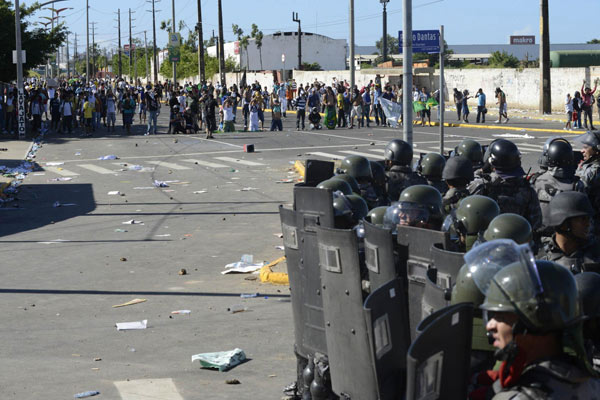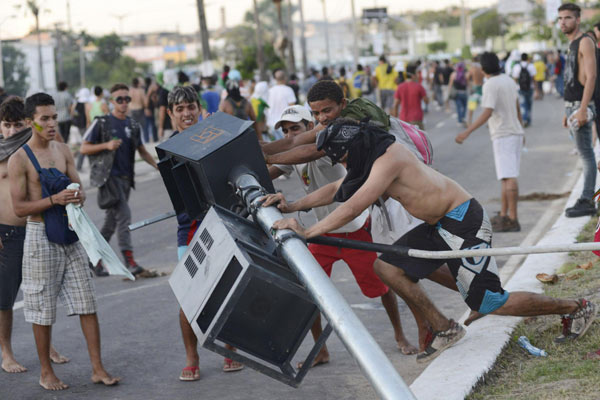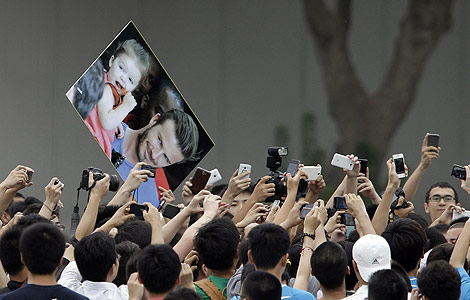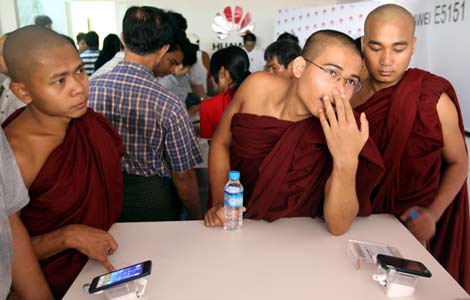Brazilians fill streets with protest, violence
Updated: 2013-06-21 09:46
(Agencies)
|
||||||||
 |
|
Demonstrators face off against riot police near the Estadio Castelao in Fortaleza June 19, 2013. [Photo/Agencies] |
Mass protests are rare in this 190 million-person country, with demonstrations generally attracting small numbers of politicized participants. The ongoing, growing marches have caught Brazilian governments by surprise, but have delighted many citizens.
"I think we desperately need this, that we've been needing this for a very, very long time," said Paulo Roberto Rodrigues da Cunha, a 63-year-old clothing store salesman in Rio.
In Salvador, police shot tear gas canisters and rubber bullets to disperse a small crowd of protesters trying to break through a police barrier blocking one of the city's streets. One woman was injured in her foot.
Elsewhere in Salvador some 5,000 protesters gathered in Campo Grand Square.
"We pay a lot of money in taxes, for electricity, for services, and we want to know where that money is," said Italo Santos, a 25-year old student as he walked with friends toward the square.
Despite the energy on the street, many protesters said they were unsure how the movement would win real political concessions. People in the protests have held up signs asking for everything from education reforms to free bus fare while denouncing the billions of public dollars spent on stadiums in advance of the World Cup and the Olympics.
"It's sort of a Catch-22," Rodrigues da Cunha said. "On the one hand we need some sort of leadership, on the other we don't want this to be compromised by being affiliated with any political party."
Earlier Thursday, the protests took on the feel of a party, especially in Sao Paulo and Rio.
People of all ages, many of them draped in flags, gathered in front of the majestic domed Candelaria church in downtown Rio, while groups elsewhere pounded out Carnival rhythms or chanted slogans targeting Rio state's governor.
At one point, a police helicopter flew over the crowd, which booed and pointed green lasers at the craft.
When shirtless youths, many of them with T-shirts wrapped round their faces, pushed and jostled their way through the crowd, people spontaneously broke out into a chant of "Without violence!"
But as has been the pattern earlier this week, the clashes began once night fell.
Several city leaders have already accepted protester demands to revoke an increase in bus and subway fares in the hopes that anti-government anger cools. In Sao Paulo, where demonstrators blocked Paulista Avenue, organizers said they would turn their demonstration into a party celebrating the lower transit fares.
But many believe the protests are no longer just about bus fares and have become larger cries for systemic changes.
President Dilma Rousseff was meeting Thursday with advisors in the heavily guarded presidential palace, according to her press office. Spokespeople did not say whether the president was discussing the protests going on throughout the country.
"This is the start of a structural change in Brazil," said Aline Campos, a 29 year old publicist in Brasilia. "People now want to make sure their money is well spent, that it's not wasted through corruption."
 |
|
Demonstrators tear down a traffic light during clashes with riot police near the Estadio Castelao in Fortaleza June 19, 2013.[Photo/Agencies] |

 7 injured at Beckham event
7 injured at Beckham event
 A science class from above Earth
A science class from above Earth
 Chinese telecom companies call on Myanmar
Chinese telecom companies call on Myanmar
 June PMI signals weakness
June PMI signals weakness
 Rising demand sends producers overseas
Rising demand sends producers overseas
 Michelle lays roses at site along Berlin Wall
Michelle lays roses at site along Berlin Wall
 Historic space lecture in Tiangong-1 commences
Historic space lecture in Tiangong-1 commences
 'Sopranos' Star James Gandolfini dead at 51
'Sopranos' Star James Gandolfini dead at 51
Most Viewed
Editor's Picks

|

|

|

|

|

|
Today's Top News
China urges resumption of six-party talks
SEC charges China-based firm with fraud
Bank of China denies monetary default report
Snowden's future hangs in balance
China reiterates support for the UN
Dairy measures start at source
June PMI signals weakness
Drug-related crimes on the rise in Xinjiang
US Weekly

|

|







